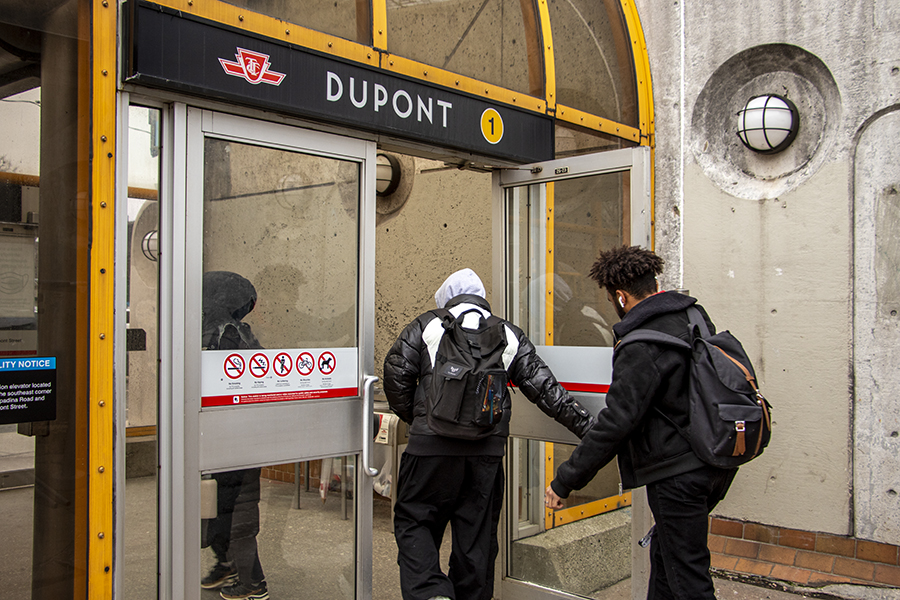Students worry about unsafe transit system after multiple records of violent incidents on the TTC.
Violent attacks on the Toronto Transit Commission’s (TTC) buses, trains and streetcars have become a regular occurrence.
Between the stabbing of a University of Toronto student on a streetcar in January and the most recent incident of a sexual assault, students are increasingly worried about their safety while taking the TTC.
All three George Brown College (GBC) campuses are accessible by the TTC and many students use the public transit system to get to school.
Fabian Lopez is a student at GBC’s Casa Loma campus. He takes the TTC roughly four times a day between classes and work.
“There is not much control or order here. There’s homeless people or drunk people …So it kind of makes it so that you have to be more aware of your surroundings,” he said, emphasizing that it has become more necessary to stay cautioned.
Safety on the TTC has become a trending topic of discussion in 2023.
A report from Richard J. Leary, CEO of the TTC released in February 2023 states that the overall number of robberies, thefts, assaults, mischief and harassment increased in December 2022 as compared to November.
In December alone, a total of 145 offences were recorded. As we entered the new year, the trend continued with several violent incidents closely following each other.
Simon Vu, another GBC student, says he tries to go home as early as possible at night to avoid being alone with people wandering around in the stations or trains.
He added that he avoids sitting too close to people.
“People feel more safe when there is more space and we can keep distance… I am really scared during peak time there are a lot of people, and we have to sit close. There is nothing else I can do.”
The City of Toronto has announced its strategies to prioritise safety on the TTC by increasing access to community safety ambassadors and security guards, and training TTC staff on de-escalation.
TTC has also taken steps such as increasing the presence of special constables on the trains and stations.
However, students believe that this is not enough.
“I think [it] is the lack of importance the government is giving to mental health issues regarding homeless people, who don’t actually know how to manage and how to treat that,” Lopez said.
Students like Lopez believe that the increasing violence may be due to lack of support services in the city for homeless people and people with mental illnesses.
At a public transit safety townhall meeting organised by advocacy organisation TTC Riders on Feb. 9, it was shared that it costs the same amount to provide warm shelter for 212 people in the city as paying 80 police officers overtime wages.
John Tory, former mayor of Toronto also acknowledged that more mental health support is needed, on a statement issued on Jan. 25.
“Lack of mental health supports undoubtedly contributes to a number of issues we are seeing in cities across the country…Mental health is health care – and it should be treated as such as funded like the rest of our health care system by the provincial and federal governments working together,” he said in the statement.
Tory has also issued statements about providing support to the TTC for safety of employees and riders.
While it seems that the city has recognised the need for improved mental-health and support services, this may only be a long-term change. Although the city and TTC seem to be strategizing long-term plans to improve safety on the public transit system, this may provide little relief to students.
Students needing to use the buses, trains, and streetcars everyday may find themselves feeling anxious or worried for their safety.
Additionally, it was noted at the public safety town hall that people experience varying degrees of vulnerability to violence depending on their ethnicity, sex, or skin colour. This may indicate a need for support to be extended towards the international and racialized students at GBC.
Students who are facing emotional or mental stress may consider availing counselling services provided by the Student Association (SA) as well as the college.
The SA’s Community Care Centre (CCC) offers peer support services to students, and prioritises six identified equity groups, including racialized students. Students can find support from these services.
Additionally, students feeling unsafe leaving or coming to college in the evenings may avail themselves of the services at SafeWalk, the SA’s proactive safety service provided on GBC’s campuses.
SafeWalk provides companions to students or staff of the college walking to or from campus to the nearest TTC station, between 6 p.m. and 10:30 p.m. on weekdays.
“When students walk with our SafeWalkers, there is a sense of reassurance that you’re not alone. Students can request a walk with us, and two walkers will go with you to TTC stops and stations within two kilometres. At night, buses and streetcars run less often and can make students feel less safe when they are waiting. Our Walkers will wait with you until you are on the bus or streetcar, or until you reach the subway stop, including Union Station,” Chris Yalousakis, SafeWalk coordinator shared.
SafeWalk also offers safety events such as the Understanding and Managing Aggressive Behaviour training which students can use as a conflict-management resource.
It seems that a collective conclusion has been drawn that the city requires better social and support services to combat the growing violence.
This might also apply to the GBC community, where students are worried for their safety on their daily commutes to and from school. The need for emotional and mental support services has become more apparent than ever in this scenario.
Students are encouraged to ask for help if needed and make best use of services provided by the college.


